Ask Me Anything... {12/8/15}
Do you have any advice for someone who will be working as a photographer's assistant?
When you're first starting and trying to learn the art and business of photography I highly recommend seeking out assistant opportunities. Even if you're just carrying bags, you can make the most of being able to observe a professional photographer's workflow and techniques on a shoot. Every photographer works differently so I'd recommend working with several photographers to gather ideas and inspiration for what you can incorporate into your own workflow.
Since my focus is Wedding Photography I'll give you a couple tips for ways to maintain professionalism and represent the photographer you're working for in a positive light:
-Don't pass out your own card to wedding guests or promote your business in any way. Yes, this happens. It is important to remember that, when you are working for another photographer, you are there to represent their business. It may even be a good idea to ask the photographer for some of their cards to hand out in case guests ask for one. On the same note, make sure to go over the photographer's terms for sharing images you take at their shoot on social media or in your portfolio. Breaking these rules is a really quick way to not be asked back with them.
-Dress professionally. Ask the photographer you're working for what they prefer you wear on a wedding day. Do they wear all black? Do they want you to look business professional? Everyone has their own preference. Again, you're there representing their business and you want to look your best.
-Be proactive. A wedding day can be kind of hectic and learning when you can be helpful without being asked is a big thing. Offer to get water for the bride and groom or for the photographer. Try to anticipate where you can be helpful.
- Be on time. Showing up on time is a direct reflection of respect for another person's time. If you have trouble with being on time, plan to arrive at least 15 minutes early.
- Observe. Take your job as an assistant as an opportunity to soak in knowledge and observe the photographer's process. This is basically like free school.
Do you memorize poses/directions?
Yes, absolutely. I spend a lot of time looking through wedding blogs, books, and tutorials to learn great poses and techniques that help achieve a natural look and feel to an image. There's absolutely no shame in having a group of "go to" poses to use on a shoot. Being able to role quickly from pose to pose with your clients helps them to feel comfortable and makes the shoot go by smoother. The more confident you are with giving direction to your clients, the more confident your clients will be in you and your process.
Sometimes I find it helpful to save images of poses I like on my phone or even take pictures of poses I like on my camera. This way I can refer to them quickly on a shoot in case I'm hurting for ideas or inspiration.
Did you create your own logo or did you hire a graphic designer?
No, I did not create my own logo. Why? Because I know nothing about graphic design. It is my firm belief that, if you are not good at something, outsource it to someone who is. Build a good team of people you trust and admire so you can form strong creative collaborations. I worked with my graphic designer, Jory Hyman, by sitting down and explaining to him what I envisioned for my brand. I chose to work with him because he's very talented and has a precise vision, he's trustworthy, and he always seems to understand my nonsensical explanations of what's in my head. He, in fact, did my entire website rebuild as well as logo design and marketing kit. Needless to say, he's great.
My logo has had a lotus flower in it from the beginning because the lotus symbolizes rebirth. I have always felt the discovery of my love for photography was a tremendous rebirth for my life's direction. I explained to him how I see my brand and the style of my images and we collaborated on creating a logo that was cohesive with all those things.



